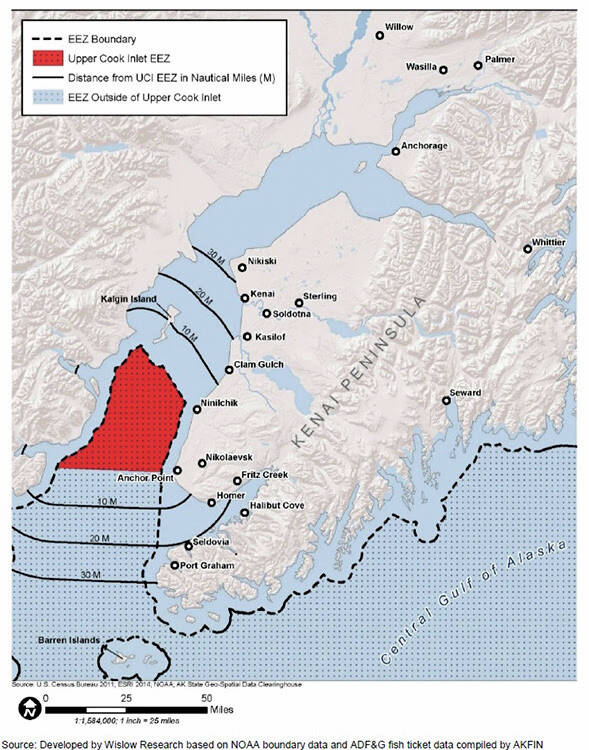The North Pacific Fisheries Management Council at its December meeting took no action on finalizing a management plan for salmon fisheries in the federal waters of Cook Inlet.
The Council, which met in Anchorage Dec. 5-14, instead “will release the analysis for a new amendment for public review and anticipated final action at the April 2023 Council meeting. This action is necessary so NMFS can implement a FMP amendment by the May 1, 2024 court-ordered deadline. The Council is not selecting a preliminary preferred alternative at this time.”
Commercial salmon in the Exclusive Economic Zone (EEZ) of Cook Inlet for harvest by drift-gill net fleet and the saltwater recreational (sport) fishery requires federal management for measurements to sustain the fishery. At the December meeting, the Council did update the motion to include and define additional assessment alternatives.
In 2020, the Council passed Amendment 14 to prohibit commercial fishing in this part of the inlet, which was met with a lawsuit from United Cook Inlet Drift Association (UCIDA) requiring further action to address management alternatives because absolute closure does not adhere to Magnuson-Stevens Act policy requirements.
Erik Huebsch, a Kasilof resident and longtime fisherman, is current UCIDA vice president and a board member with the Alaska Salmon Alliance. He said he is disappointed in the lack of progress being made on the issue, the length of time it has already taken and continued lack of decision at the December meeting given the time remaining until the 2023 season.
“The Council really didn’t do much,” Huebsch said. “They added a few details to what they were already looking at in the draft FMP but with no conclusion. There is no progress yet.”
In response to UCIDA’s court case, Homer Mayor Ken Castner and Homer City Council adopted Resolution 21-091 directing the city attorney to prepare and file a friend of the court, or amicus brief supporting the case.
The brief states Homer’s “multi-generational local history and invested interest in the fishery and the community’s economic livelihood will be irreparably damaged through the loss of tax income, Port and Harbor fees, and it will eliminate jobs currently held by fishermen, seafood processors, truck drivers, ocean shipping companies, fuel distributors, fishing gear dealers, boat builders, mechanics, and all of the other small businesses that rely on the fishery for their livelihood.”
There are currently 185 Cook Inlet drift permit holders (S03H) with a Homer zip code in the State of Alaska Commercial Fishery Entry Commission (CFEC) permit database and several hundred more in other communities across the peninsula.
Though no decision was made at the meeting, the Council honed additional and more specific options for two of the potential policy alternatives.
Alternative 2 is “Federal management of the fishery in the EEZ with specific management measures delegated to the State.” Alternative 3 is full “Federal management of the fishery in the EEZ.”
Huebsch said the council is running out of time to make a decision because the date is so close to the start of the 2023 salmon season. “In April, they will have to make a decision and turn it over to the National Marine Fisheries Service,” he said.
Impact assessment material available on the Council meeting website includes hundreds of pages of detailed information related to social-economic components of the fleet, such as permit holder information, residency, permit values, number of active permits, tax information (www.npfmc.org).
There are also presentation PDFs describing the history of the situation and more details for various policy alternatives. More information on the legal case can also be found on the UCIDA website (www.ucida.org).
Emilie Springer can be reached at emilie.springer@homernews.com.

